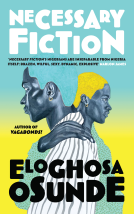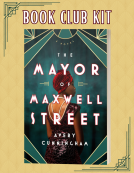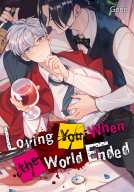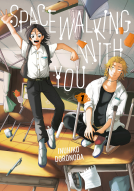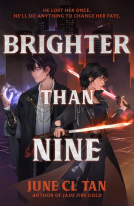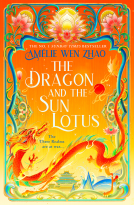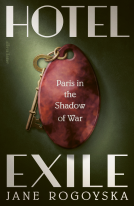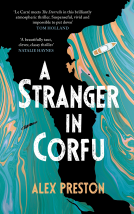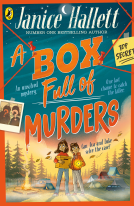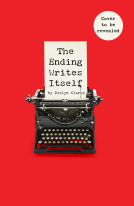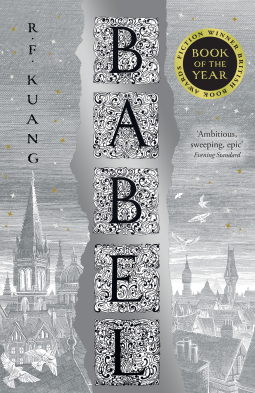
Babel
Or the Necessity of Violence: An Arcane History of the Oxford Translators’ Revolution
by R.F. Kuang
This title was previously available on NetGalley and is now archived.
Send NetGalley books directly to your Kindle or Kindle app
1
To read on a Kindle or Kindle app, please add kindle@netgalley.com as an approved email address to receive files in your Amazon account. Click here for step-by-step instructions.
2
Also find your Kindle email address within your Amazon account, and enter it here.
Pub Date 1 Sep 2022 | Archive Date 16 Jan 2024
HarperCollins UK, HarperFiction | HarperVoyager
Talking about this book? Use #EnterBabel #NetGalley. More hashtag tips!
Description
‘One for Philip Pullman fans’
THE TIMES
‘This one is an automatic buy’
GLAMOUR
‘Ambitious, sweeping and epic’
EVENING STANDARD
‘Razor-sharp’
DAILY MAIL
‘An ingenious fantasy about empire’
GUARDIAN
'Literary super-stardom doesn't seem too far out of her reach now'
THE HERALD
Traduttore, traditore: An act of translation is always an act of betrayal.
Oxford, 1836.
The city of dreaming spires.
It is the centre of all knowledge and progress in the world.
And at its centre is Babel, the Royal Institute of Translation. The tower from which all the power of the Empire flows.
Orphaned in Canton and brought to England by a mysterious guardian, Babel seemed like paradise to Robin Swift.
Until it became a prison…
But can a student stand against an empire?
An incendiary new novel from award-winning author R.F. Kuang about the power of language, the violence of colonialism, and the sacrifices of resistance.
'A masterpiece that resonates with power and knowledge. BABEL is a stark picture of the cruelty of empire, a distillation of dark academia, and a riveting blend of fantasy and historical fiction – a monumental achievement’
Samantha Shannon, author of THE PRIORY OF THE ORANGE TREE
R.F. Kuang’s book ‘Babel’ was a New York Times bestseller w/c 11-09-2022.
Available Editions
| EDITION | Ebook |
| ISBN | 9780008501839 |
| PRICE | £5.49 (GBP) |
| PAGES | 650 |
Available on NetGalley
Average rating from 173 members
Featured Reviews
Does Babel deserve all the hype?
For me it does.
When I received an arc of this beauty I literally jumped and screamed for 20 minutes and it was totally worth it. I'm 99% sure this is gonna be my favorite book of this year.
Chapeau Rebecca!
Babel follows Robin's tale, a chinese boy, who is born in the Canton province and is taken to London by a language professor.
We will then follow him to Oxford and more specifically in the Babel tower where we will meet the translators who have a very importanto role in the English empire.
This setting lays the foundations for an amazing dark academia: if first we are attracted to the academia world, later we realize how corrupted and dark is this system. We can see this even with the change of the characters.
The magic system is original and well structured: it circles around languages and the match pairs.
Match pairs are written on silvers bars that can do a lot of different thing like heal a person, kill someone etc. and this England actually lives on these.
A big focus is the words origin and how translation is complex and it can't always be trusted because there not a word that perfectly corresponds. From this we have the incipit: Traduttore traditore (which is translator - traitor).
For me it was extremely interesting but I think for someone not interested as much as I am in this subject it could result in something boring and slow.
Bur I think Rebecca actually did an excellent work writing this.
Talking about the character, I found them well done and extremely different from each other.
Robin, Ramy, Victoire and Letty are the main cast and thanks to them we get to live many emotions and experiences. A reocurring theme is the racism and how a a foreing person is treated differently and seen in a bad way, especially in this historical period even thought is something that still happens.
We can see this from different perspectives: from Ramy or Victoire, who are pc characters, but also from Letty who was born and raised in London but she's really close with the trio.
This dynamics will be the cardinal point of the book, in addition to the language and the translation.
Secondary characters I found really fascinating were the professor and Marshall, but I don't want to tell you to much so I will stop now!
Babel is an original, complex, dark book full of important and actual themes but it's not for everyone. If you look for something happy this is definitely not for you and will only give you a trip to the psychiatric hospital.
If you want something not too heavy this is also not for you because it requires attention, but if you want to loose yourself in linguistics, Babel will wait for you with open arms.
“Languages aren’t just made of words. They’re modes of looking at the world. They’re the keys to civilization. And that’s knowledge worth killing for.”
Babel, or The Necessity of Violence: An Arcane History of the Oxford Translators' Revolution is an incendiary indictment against colonialism. Within this superbly written slow-burner of a bildungsroman, R.F. Kuang presents her readers with an extensive critique of eurocentrism, scientific racism, white supremacy, elitist institutions and the hoarding of knowledge, and British imperialism that is by turns didactic and impassioned. If you are a reader who isn’t particularly into nonfiction but you are keen on familiarizing yourself with discourses on colonialism, decolonization, and postcolonialism, or are interested in linguistics (translation, interpretation, language contact), or learning more about the circumstances that led to the First Opium War, you should definitely consider picking Babel up.
Babel is a rare example of how—in the right hands—telling can be just as effective a storytelling method as ‘showing’. Kuang’s storytelling is quite frankly superb. And not only is the narration immersive and encompassing, but it is also informative and thought-provoking. Undoubtedly readers will feel angry by what they will read, and the unrelenting racism, discrimination, physical and emotional violence experienced by the story’s protagonist, Robin. This is a decidedly heavy-going story. And yet, thanks to Kuang’s bravura display of storytelling, readers will find themselves persevering, despite the foreshadowing that presages worse is to come…
The majority of the novel takes place in an alternate 1830s Oxford where Babel, the University's Royal Institute of Translation, is the ‘pioneering’ centre of translation and 'silver-working', an act that catches what is lost in translation and manifests it into being. After cholera decimated his family, Robin, a boy from Canton, is whisked away from China to London by the imperious Professor Lovell, who happens to be a renowned professor at Babel. Robin has no choice but to follow and obey Professor Lovell’s strict study regimens. Not only does Professor Lovell impose a punitive lifestyle on Robin, forcing him to dedicate his every waking moment to the study and learning of languages, but he devests him of his ‘former’ name and makes him relinquish any remembrances of his former life. Additionally, Professor Lovell subjects Robin to many forms of abuse: from spewing ethnocentric and white supremacist speeches, to physically ‘punishing’ Robin. Growing up in this environment Robin grows to resent his ‘mentor’, and yet, even so he is desperate to belong. Besides his tutors and Professor Lovell, Robin only really interacts with his mentor’s housekeeper, who, despite being the only person to show him any tenderness, is nevertheless complicit in Professor Lovell’s continued abuse of him. Robin’s childhood is not a happy one, in fact, it is not really a childhood at all. The setting combined with the misery of it all brought to mind the work of Charles Dickens. Unlike Dickens’ heroes, Robin is not only disadvantaged by his being an orphan but by not being white, something that ultimately makes him a very un-Dickensian character. Professor Lovell’s oppressive ‘rule’ instils in Robin a sense of fear: while he does have a lot of questions (how did the professor find him? why him? why is he 'bestowing' on him such an education? what will await him at babel?) he is weary about disobeying him. Moving to Oxford opens Robin up to a world that is both awe-inspiring and terrible. At Babel he can master languages in even more depth, he can be surrounded by hundreds of years of knowledge, and by (supposedly) like-minded individuals.
“They’d been chosen for privileges they couldn’t have ever imagined, funded by powerful and wealthy men whose motives they did not fully understand, and they were acutely aware these could be lost at any moment. That precariousness made them simultaneously bold and terrified. They had the keys to the kingdom; they did not want to give them”
But even Babel has its own set of hierarchies, which prioritize whiteness and European cultures and languages. While Babel, unlike other colleges at Oxford, admits a more diverse student body, compared to his white peers, Robin is treated with a mixture of fascination and disdain. The older students seem unwilling to mingle with first-years so inevitably Robin becomes close to his cohort: Ramy, Victoire, and Letty.
Robin and Ramy become particularly close, and their bond is one of the novel’s strengths. It isn’t a particularly straightforward relationship but their similar experiences and circumstances intensify their kinship. There is a chapter relatively early in the novel that focuses on their early days getting to know each other which was immeasurably bittersweet.
“[This] circle of people he loved so fiercely his chest hurt when he thought about them. A family. He felt a crush of guilt then for loving them, and Oxford, as much as he did. He adored it here; he really did. For all the daily slights he suffered, walking through campus delighted him.”
You feel such relief for Robin to have found someone who just gets what it means to be seen as ‘other’, to be treated as ‘inferior’, 'un-English', and to have been deracinated from their homelands and to feel such contrasting emotions at being at Oxford, an institution that upholds racist ideologies. In this ‘alternate’ setting this contrition is even more felt given the role that Babel plays in silver-working and of how silver bars are enabling the British empire to amass even more power and wealth and to further ‘expand’. Robin believes that by staying at Babel, he is surviving. Ramy however is more openly critical of Britain. The duo is later joined by Letty and Victoire, who, being girls are also subjected to discrimination. Like the boys, Victoire, who is Black and was born in Haiti, has an extremely fraught relationship with Babel. Letty, who is white and was born and raised in Britain in a relatively well off family, is in some ways the odd one out. Yet, she seems intent on portraying herself as a victim, in any circumstance really, often referring to her own experience with misogyny to negate Robin, Ramy, and Victoire's experiences with racism and colonialism. Additionally, her brother died, which Lety, we are both told and shown this, uses to earn her ‘friends’ sympathy. We are meant to hate her, and hate her I did. Imagine the most annoying aspects of Hermione Granger’s character and you have Letty (stubborn, sanctimonious, a stickler for rules). She is a colonialist apologist who, despite being ‘exposed’ to the perspectives/realities of people who have been colonized or have experienced violence at the hands of the British empire, remains firm in her stance (we learn this quite early on so i don’t think it’s that much of a spoiler). I recently came across this quote by Oksana Zabuzhko, a Ukrainian writer, that very much applies to people like Letty: “This is what power really is: the privilege of ignoring anything you might find distasteful.’ Certainly, we can see why at first Robin, Victoire, and Ramy would not oppose Letty’s presence in their group. These opinions have been instilled in her by her upbringing. But, when the months and years go by and Letty's belief in the British empire remains unwavering…well…her presence in the group didn't make much sense. I couldn’t fathom why the others would keep her around. I get that she existed to make a point, and sadly I know people like her (who resort to self-victimization whenever confronted with anything resembling criticism) but I just found her beyond irritating and obnoxious. She has no redeeming qualities. And it annoyed me that she took the center stage in many of the group interactions and took away page-time from characters like Ramy and Victoire. I wish she could have been pushed to the sidelines more, and maybe for her then to take more of a role when sh*t starts going down. But I digress.
At Babel Robin finally learns more about silver bars and dio mio, it isn’t good. He learns just how powerful language can be and has to reconcile himself with the knowledge that he is contributing to the enrichment of the British empire. Robin is approached by a member of a secret organization, Hermes Society, whose aim is to sabotage the silver-working that goes on at Babel and disrupt the status quo. Robin feels at a crossroad, damned if he does, damned if he doesn't. While he does still experience racism and discrimination at Babel, it is there that he can access knowledge that would otherwise not be accessible to him. And, of course, it is there that he was able to meet Ramy and Victoire (i should really include letty because robin does care for her but i cannot bring myself to). Babel also has shielded him away from Professor Lovell, who he now sees only on rare occasions, and given him the kind an opportunity that many others will never have...but that doesn't make him unaware of how, beneath its 'enlightened' veneer, Babel is rotten. Can he help Hermes Society if their acts of sabotage include or result in violence? Is violence inevitable in a revolution? And by choosing not to act does he become a cog that keeps the British empire running?
“He hated this place. He loved it. He resented how it treated him. He still wanted to be a part of it – because it felt so good to be a part of it, to speak to its professors as an intellectual equal, to be in on the great game.”
Robin is torn between his hatred for the British empire and the safety he believes he can only experience at Babel. Kuang renders his inner conflict with painful accuracy and extreme empathy. While other characters may be critical of Robin’s unwillingness to ‘choose’, readers won’t be as ready, and in fact, they will find themselves unable to judge him. He tries to help but inevitably his indecision leads the Hermes Society to decide for him. It is only when Robin is forced to confront the consequences of the opium trade—on China, on the Chinese population, and on the Indian farmers who harvested it—that he finds himself ready to act. But, things do not exactly pan out as the story takes us on a The Secret History kind of detour that will undoubtedly appeal to fans of whydunnits and dark academia. While the atmosphere prior to this event was by no means light-hearted after this happens Kuang ups the tension all the way up. The shifting dynamics within and outside of Robin’s group also change, and not necessarily for the better. And the stakes are just sky-high.
Like the summary says, Babel ‘grapples with student revolutions, colonial resistance, and the use of translation as a tool of empire’. We witness the many forms that power takes, and one of them is in fact language. Kuang’s interrogation of the act of translation is utterly compelling. My mum is a translator and I am bilingual and have recently started studying two other languages. Suffice to say, whenever I see a book exploring linguistics, I am interested (be it sci-fi like Arkady Martine's Teixcalaan series, literary fiction such as Batuman's The Idiot, or nonfiction like Lahiri's In Other Words). And Kuang really presents us with so many interesting facts and insights into translation and untranslatability. Kuang pays incredible attention to words and their various meanings, which truly enriches Robin’s story and his experiences at Babel. Kuang discusses contact-induced change (which sometimes results in language death) and reading about it even feel guilty about having neglected my ‘mother-tongue’ (on a side note: i have noticed that here in england people seem less interested in learning languages as they rely on english being the most widely spoken language worldwide…). While Kuang does acknowledge Morse code, braille and sign language and other nonverbal forms of communication do not really get a mention which is a pity. Nevertheless, Kuang presents us with such nuanced discussions around language and translation, I loved the attention she pays to the etymology of words, double meanings, and the ambiguity of language and interpretation…
“In Classical Chinese, the characters 二心 referred to disloyal or traitorous intentions; literally, they translated as ‘two hearts’. And Robin found himself in the impossible position of loving that which he betrayed, twice.”
Like I said early on, the writing sometimes shifts into a telling mode, so we have swaths of time which are summarized into a few lines, or certain events or arguments are related to us indirectly. But, Kuang storytelling is such that what we are being told feels incredibly vivid and—for the better and worse—immersive. Some of the lectures Robin attends may occasionally seem a bit too long or pedantic, and I wasn’t always keen on the footnotes (more on that later), but I was never bored. Robin is such a compelling narrator and my heart went out to him. This povero ragazzo really can’t catch a break. And when he finds some solace, with Ramy and Victoire, we have Letty to stir things up or spoil the group’s rare moments of contentment. He hates Professor Lowell who is just so f*cking despicable and full of vitriol but also ‘perversely’ wants to earn his approval. He is also burdened by the realization that as the years go by he struggles to recall his mother and his early years in China. Once in England and under Professor Lowell’s ‘tutelage’ Robin feels caught in a constant state of alterity: while the story mentions that there are occasions where he can ‘pass’, he experiences overt racism and microaggressions on the daily. And he isn’t given the tools or words to express this profound sense of injustice and alienation. Ramy and Victoire become his lifelines as he is finally given the chance to try to name the difficult thoughts and feelings he experiences living in a country that sees him and those like him as ‘barbarians’. Speaking of barbarians, I really appreciated how Kuang highlights the irony and hypocrisy of those British people who will claim that the people they are colonizing or waging war against are ‘violent’, ‘savages’, and ‘uncivilized’ and therefore deserving of being colonized, oppressed, and killed.
‘How strange,’ said Ramy. ‘To love the stuff and the language, but to hate the country.’
‘Not as odd as you’d think,’ said Victoire. ‘There are people, after all, and then there are things.’
I found Robin to be such an endearing character. Kuang captures the disorientatio of living somewhere where you are and will always be perceived as a perpetual foreigner. His longing for a place to belong to is truly heart-wrenching. He is not flawless but I genuinely believe that he always tries his hardest to do good by others. Sometimes self-preservation kicks in and he finds himself at a standstill. He feels a moral obligation to help the Hermes Society but is not quite ready to be responsible for the destruction of Babel. Yet, when he realizes that he is becoming complicit in the injustices perpetrated by Babel..well, he has to question whether his loyalties can even align with those responsible for maintaining unjust systems of power.
“Yet didn’t he have a right to be happy? He had never felt such warmth in his chest until now, had never looked forward to getting up in the morning as he did now. Babel, his friends, and Oxford – they had unlocked a part of him, a place of sunshine and belonging, that he never thought he’d feel again. The world felt less dark now. He was a child starved of affection, which he now had in abundance – and was it so wrong for him to cling to what he had? He was not ready to commit fully to Hermes. But by God, he would have killed for any of his cohort.”
Ramy, who is more impassioned and outspoken, balances Robin perfectly. Their shared moments together do have certain undercurrents but these remain largely unspoken. And in some ways, it is this elision that made it all the more obvious.
Letty…I have said enough about her. She, similarly to Professor Lovell, remains unchanged throughout the course of the narrative. We know the kind of people they are from the very first and I am afraid that in some ways Letty is worse than Professor Lovell. Her acts of self-dramatization and victim playing drove me up the walls.
Victoire was sadly underused. Her characterization sometimes relied too much on opposing Letty’s one (we will have letty responding in a certain way to something and then we will get a different response from victoire). I just would have liked less page-time spent on Letty—who, however believable she is, is neither an interesting nor compelling character—and more on Victoire. In the latter half of the novel, Victoire is given more room to breathe but due to the pace of the plot, the storyline can't really focus on her.
I liked how many secondary characters come into play in the latter half of the novel and I was surprised by the role some of them play in the story.
Reading about Britain’s ‘past exploits’ is by no means fun. Yet, somehow, Kuang is able to make Robin’s story wholly captivating and hard to put down. The anxiety I felt for him, and later on Ramy and Victoire, made me go through this nearly 500+ pages tome of a book at a relatively fast speed.
There is much to be admired in Babel. There were a few minor things that kept me from giving this a 5 star. At times Kuang could be a bit heavy-handed when elucidating certain points, and part of me wishes she could have trusted her readers more to reach certain conclusions without having our hands held all the way there. Letty, well, she stole too much time away from Robin, Ramy, and Victoire. I would also have loved to see some confirmed queer characters…but alas. While I appreciated that Kuang does take into consideration the experiences of working-class people, without condemning or condoning their behaviour towards our group, there was this one scene where a mob of mill workers are shouting at Babel students and their northern accent is described as 'rough and incomprehensible'...which...wasn't great. We already know that they are 'snarling' so these descriptors seemed unnecessary and play into existing negative stereotypes about regional accents. Kuang was spot on about British food though…
The tragic denouement also left me feeling rather bereft. This was intentional no doubt but still despite the inevitability of it all I felt betrayed having become so invested in the story and its characters. But these things are very minor and kind of inconsequential given the scope and the depth of the narrative. Additionally, I really liked the intersectional and dialectical approach Kuang takes in her condemnation and deconstruction of eurocentric and white historical narratives.
“History isn’t a premade tapestry that we’ve got to suffer, a closed world with no exit. We can form it. Make it. We just have to choose to make it.’”
The realization that the author is my age makes me feel a mixture of befuddlement and intimidation. I mean, despite a few minor criticisms, this novel is a literary Achievement with a capital A.
‘But what is the opposite of fidelity?’ asked Professor Playfair. He was approaching the end of this dialectic; now he needed only to draw it to a close with a punch. ‘Betrayal. Translation means doing violence upon the original, means warping and distorting it for foreign, unintended eyes. So then where does that leave us? How can we conclude, except by acknowledging that an act of translation is then necessarily always an act of betrayal?’
When I approached this I did so under the impression that it would be something in the vein of Jonathan Strange & Mr Norrell, Zen Cho's Sorcerer Royal Series, and, like I said earlier on, Charles Dickens. And while there were brief instances within Babel where those comparisons rang true, for various reasons and to different degrees I was also reminded of Cornelia Funke, Philip Pullman's His Dark Materials, Laini Taylor's Strange the Dreamer and books by Natasha Pulley (letty is for sure a very pulley-like female character). And yes, superficially Babel also carries echoes of a certain series by you-know-who.
However, make no mistake, Babel is an ultimately unique and imaginative work like no other. Maybe if you expect this to be heavy on the fantasy, like Cho and Clarke’s books are, well, you may find the magical element in Babel to be rather subdued. Despite its fantastical nature the narrative grounds silver-working in realism, and I thought it really fitted the solemn tone of the story. Whereas Cho and Clarke's proses are bombastic and playful, Babel is more sombre and precise. It is also moving and clever, and Kuang’s commentary is razor-sharp and brilliant.
Both thematically and genre-wise Babel packs a lot. We have a bildungsroman set in an 'alternate' 1830s Oxford with the addition of a fantasy element. Through Robin’s story Kuang carries out an unflinching and urgent interrogation of colonialism and colonial resistance, knowledge and power, language and translation, privilege, racial science and systemic racism, industrialization, gender and class-based discrimination, and much more. Friendship, loyalty, hatred, and betrayal, all of these also come into play in Robin’s gripping story.
“The origins of the word anger were tied closely to physical suffering. Anger was first an ‘affliction’, as meant by the Old Icelandic angr, and then a ‘painful, cruel, narrow’state, as meant by the Old English enge, which in turn came from the Latin angor, which meant ‘strangling, anguish, distress’. Anger was a chokehold. Anger did not empower you. It sat on your chest; it squeezed your ribs until you felt trapped, suffocated, out of options. Anger simmered, then exploded. Anger was constriction, and the consequent rage a desperate attempt to breathe. And rage, of course, came from madness.”
Thrust into Oxford of the 1800’s, the authors world and writings were so vivid, I felt like I could have been there. He painted such a realistic portrait of Oxford of the times, that it truly felt like stepping into Oxford as I stepped into the pages of this book.
I can’t put my finger on what made this book so enchanting and addicting, but lordy I was enchanted and addicted! It kept me entertained, which is quite a feat for this hefty sized book. I found myself invested in the story and enlightened too as we glimpsed into history. I wasn’t expecting to learn so much from this book too. Beautiful little insights into language and origins of words, it was amazing.
You can really tell the author put in some series hours into the research of this book. Almost no stone was left unturned and the amount of effort into accurate portrayal (and justification for any artistic license which skewed accuracy a little) was outstanding. I also loved the use of footnotes in this; a rarity for a fiction book that worked so well and added so much to the experience of reading.
The characters were depicted and described so well, and really found myself roped into their plights and struggles. The more I read, the more I couldn’t stop reading. And wow the end; real on the edge of your seat stuff. I found myself so pleasantly surprised with how much I enjoyed this. Absolutely brilliant!
I really want to thank Netgalley for granting my wish for an ARC of Babel by RF Kuang. I cannot express how lucky I am to have read this!
Babel has been one of my two most anticipated books for 2022. I never really thought I would get the chance to read an advanced copy of this, and I screamed when I got approved! And I can honestly say the book did not disappoint.
Babel is dark academia. Done academically. As it should be. This book terrified me, being 560 pages of fact based linguistics and history, but the plot is written with such care that you cannot help but fall in love with the main characters very early on in the story.
The story follows a young Chinese boy, saved from certain death, who is given the chance to study linguistics in England with the hope of getting into Oxford and become a translator for Chinese texts. It follows Robin, said main character, in his journey to Oxford where he eventually meets other people his age who have also been granted access to the linguistic department - Babel.
The magic system in the book is very subtle but very original, as it works on the principle of imbuing silver bars with very specific linked meanings in two related languages. This creates the energy to exact the desired effect. But this magic system works in a slightly sinister way - by collecting native speakers from all around the world and hoarding that knowledge to only benefit the British Empire.
This book is so eye opening to the extent which the world was taken over by the British in the beginning of the 1800's. And it challenges how much we know about our history. If you read this and you are from any country that has been under British rule you will recognise your country's history in here. It really should be a book that everyone reads.
This book lived up to my expectations. I keep seeing that this is a standalone, but I hope to one day see more stories set in this universe, expanding on the repercussions of this book. As always, RF Kuang's mind has left me in awe! Absolutely loved this book!
Babel was one of my most anticipated books of the year and it completely exceeded all my expectations. Now that I’ve read it it’s safe to say that this is the best book I’m gonna read this year. There’s just no way anything else could top it.
First of all I want to commend R. F. Kuang for the amount of research that went into this book. It was just insane, you could really feel that while reading. The worldbuilding relies in real events but also in translation and linguistics and these aspects were explored in such an original way. The basis for the magic system is translation, and being someone who doesn’t have English as my native tongue I’m never going to think about translation in the same way, specially when a word doesn’t really convey the exact same meanings in a different language
This book just made the standard for the Dark Academia genre so much higher. First of all, I really loved the way Kuang used footnotes cause it was kind of like reading an academic text. There was a lot of focus on what they were learning, and the themes of linguistics, etymology and translation are so interesting. At times it felt like i was at a lecture learning about these things, but it was never boring.
I also love how the magic system was linked to england’s colonialism and the exploitation of the countries, specially because that is so linked to academia. This book made me think a lot.
The first 20% was a bit slow, but after that the pacing turned really great, I just couldn’t stop reading. Some of the twists were shocking but even the ones you could see from miles away were done in such a brilliant way that I still felt the emotional impact. Kind of like a trainwreck that you can see coming but you can’t do anything to stop it, it built so much anticipation.
I loved the characters and while I felt emotional attached to them, I sort of think the secondary characters could be as developed as Robin was. But I understand maybe that wasn’t the focus. It was all about the story and a bigger picture.
I also felt like the title “The Necessity of Violence” was really fitting. It provoked outrage and visceral reactions in me and I love when a book can do that. I was speechless several times at how the themes were treated, I think it was different from everything i’ve read. R. F. Kuang created a masterpiece here and made this book an instant favorite of mine.
 Reviewer 539091
Reviewer 539091
Okay, so. I have a lot of notes on my phone, but I am not sure I’ll be able to write a coherent review, because this book was so impactful, I still have a hard time processing it. Also, even if I took notes, I was really invested in my reading, so I’ll probably forget something.
All that being said, let’s start with the review. First of all, I am so happy we got to follow Robin’s life ever since his childhood and that we first met him in Canton. I was expecting the story to start when he was already at Oxford, or closely before, instead we fully experience his transition from China to Britain. There’s a particular scene in which they make him pick a new name, because his Chinese one is seen as something to change, that literally broke my heart and started igniting my hatred towards Professor Lovell.
Overall, I think the plot was extremely well crafted; it is not a fast paced by any means, but the story flows perfectly from page one. Initially, I was a bit perplexed about the secret society aspect, but it all made sense after a short while. I was engaged from beginning to end and at no point did the plot drag. R.F. Kuang really is a talented writer and I would read anything she publishes, at this point, because I just love her style and ideas.
What I liked the most, however, was the different point of view; dark academia is a deeply white aesthetic/subgenre, and having the POC perspective on every part of it. I loved the discussions around race, class, gender and all-around privilege. It was so well done and I think we need more dark academia books like Babel, but Babel is sheer perfection and I don’t believe it can be topped, so maybe we just need Babel and R.F. Kuang…
Now, I am going to say something weird. You know how usually people divide books into plot-driven or character-driven? Personally, I’d say Babel is neither. It’s more so a conceptually-driven book, and it is very appropriate for how it is built. I don’t know how else to explain, but while both plot and characters are spectacular, it is really the ideas and concept that bring together every piece of the book. I hope this makes sense, if not, I’m sorry.
I also personally found the ending to be the best conclusion to the story I could have hoped for, but I think it will be a divisive one, a bit like If We Were Villains, but for different reasons. Also, there was a lot of foreshadowing in the book, I’d say, and the atmosphere was perfectly rendered through every single detail. Just amazing, I don’t know what to add.
I would love to see more books set in this world, but it is such a good standalone and with such a good ending that I don’t know what to wish for, to be honest.
Something I adored is the worldbuilding: the way linguistics and linguistic theories were used to create a magic system was pure genius. Finding things I’d studied when I was still a university student interwoven in the worldbuilding was both weird and extremely satisfying. I think the way languages, etymology and cultures were explored was amazing. I also believe it will be equally accessible to linguistics nerds as myself and newbies. R.F. Kuang explained everything you need to know, and — in the end — even if you don’t grasp 100% of what they are saying, you’ll still understand the most important bits.
I also fell in love with the way History was there all the times. Not only huge historical events were linked with the main plot, but Kuang also mentioned people such as Daguerre and Morse and made them part of her magic system and worldbuilding. This is the best kind of historical fiction, in my opinion, when it is clearly fiction, but you can feel History being there, not just for aesthetic purposes, but for narrative ones.
Well, onto my favourite part to discuss: the characters. As I said, I loved them, and I loved them all. My notes literally say “I would die for them, especially Ramy”. I also wrote down “I’m in love with Ramy, I hope he isn’t the Bunny of the situation”. If you’ve read the Secret History you’ll know what I mean, but I am not going to say if he was. One of the things I appreciated the most is definitely their relationships with one another, but the best of the best is definitely Robin and Victoire’s growth. I am not gonna say anything spoilerish, but I loved how they both had a character development in the same direction while diverging completely. I know it doesn’t make sense, but I swear I am not making it up.
Stylewise, the book was written in a way that made it perfect for its contents. Firstly, it has notes and I loved the ironic/witty way they were written. In the audiobook version, there’s going to be two different narrators, one for the main text and one for the notes, and I think that’s gonna give back a great effect. I liked the way the author used lots of archaisms (well, not really archaisms since it’s set in the 1800s, but you know what I mean) and lots of synonyms with a Latin etymology. It felt like reading a novel and an essay at the same time, which I believe is the goal with this kind of book, so I must bow to R.F. Kuang. As I said, I think she is one of the most talented writers out there and I can’t wait to see what she has in store next. I am really curious about Yellowface, but also future books.
Before wrapping this long review up, I want to add a little something: the title is the most fitting title ever given to a book. I love that it is super long, I love that it has weird punctuation and that it looks like the title of a university essay. I just love everything about it.
Lastly, some random notes I took, without context: “My God, these bitches gay, good for them, good for them”, “I hate white men”, “Professor Lovell is the worst”, “Gay, gay, homosexual gay”, “I want to kill [redacted]”, “Finally!!”, “I love everything, holy shite”.
I don’t think this is a book for everyone, and I can see why some might not like it, but I think it’s something you should at least give a try to, because, really, it is so well crafted and so well thought out. Be sure to place your pre-order and don’t forget to support the author!
That’s all. Or, not all, but all I am going to say, because this review has one too many “perfects” in it and I can only repeat how amazing this is. I can’t wait for it to come out to see what y’all will think and if you’ve already read it, I’d love to know your thoughts.
Okay, so I'm going to try to be articulate enough to review Babel with the care it deserves but I don't know if that's possible.
I am a huge admirer of R.F. Kuang and I knew this story was clever but I don't think I was prepared for just how intelligent it is. Kuang eases you in her world with so much care and confidence that the first half of the book flows and you don't even notice. I fell in love hard with the characters, because they're formidably written -sure- but also because the author's characterization is completely her own. They reminded me of the characters she had previosuly given life to and it was like being reunited with old friends. Don't get me wrong, Robin, Ramy, Victoire and Letty have a mind and a presence of their own but they felt like old friends nonetheless.
The atmosphere is wonderful and I almost missed my own uni days. Chapeau for that! Dark academia lovers, this is definetely the book for you.
The fabulism element wasn't something I was prepared for and I really marvel at how imaginative it was. You can feel the amount of research that went into this book, which I loved.
Now, I don't think I have enough braincells to explain how important the conversations about race, class and misogyny are. I'm sure we can all agree that the academic world, fictional or not, needed this.
So thank you R.F. Kuang, for this story that means the world to me.
*Review based on the eARC provided by the publisher as an own-voice reviewer - thank you Harper Reach for allowing me to read this one in advance!*
 Bookseller 684739
Bookseller 684739
This book was amazing.
I haven't read The Poppy War, but as someone who majored in linguistics, the premise of an alternate history where translating is magic immediately intrigued me. And it was so, so good. I felt attached to the characters and the world-building (which was really clever and immersive), and about half-way through the book takes a turn and suddenly it became really suspenseful, causing me to gasp and cry several times in public.
The author cleverly romanticises dark academia, and proceeds to absolutely tear it down. This has been the best book I've read in 2022 so far.
what can I even say? it's absolutely phenomenal.
babel is by far the most ambitious historical fantasy book on colonialism and resistance that i've ever read, and it surpassed all my expectations. i loved how the themes of colonial oppression, revolutions, worker revolts, violent resistance, and the power of language were tackled - and the way rf kuang managed to weave in an original magic system throughout all these themes is honestly brilliant.
i’m numb with emotions right now. I really can’t think of a straight sentence about this book without wanting to scream into my pillow.. Babel and Rebecca Kuang didn’t come to play, because this was a fucking masterpiece and I will die on this hill.
 Chris H, Media/Journalist
Chris H, Media/Journalist
My first RF Kuang novel is a 19th century-set dark academia fantasy where silver bars can be imbued with fantastical purpose, colonialism is alive and well, and a
Following a young orphan who is taken in by a mysterious benefactor and instructed in all things linguistic, the book follows Robin, said orphan, as he eventually joins a cohort of other linguists in Oxford. To say anything more would spoil the novel which I heartily recommend to all who are remotely interested.
It is dazzling and emotive, full of heart and darkness, cruelty and kindness, and bittersweet longing from front to back. As someone who never read Kuang's POPPY trilogy at the height of its popularity on social media, this is a masterful display of writing and one of the best books of the year.
 Serena B, Reviewer
Serena B, Reviewer
I almost didn't request a copy of Babel but I am SO GLAD that I did.
The novel follows Robin Swift, a young boy in Canton who is transported to England by a mysterious guardian following the sudden death of his family in Canton. He is taught Latin and Greek to accompany his native tongue and then shipped off to Oxford University to use his language skills in aid of the British Empire.
You can just tell how much meticulous research has gone into the worldbuilding. The magic system in Babel is conceptually brilliant and fits perfectly in the Victorian English setting. The characters felt real - the novel never shys away from showing their flaws - and their motivations made sense (even when I HATED everything about what *certain characters* were doing).
The blurb mentions that Babel is a tonal response to Jonathan Strange and Mr Norrell and I cannot agree more - with the caveat that in actuality I think Babel has gone above and beyond its predecessor in every way.
I will definitely be buying a copy of this book when it releases officially.
I knew I was going to enjoy BABEL ever since the first artwork was revealed over a year ago. Fast forward to today, I can proudly say that this is hands down THE BEST Dark Academia book that I’ve ever read in my life. R.F Kuang wrote a masterpiece and I am forever grateful to her for this. I did not think it was possible to be consumed by a book but BABEL proved me wrong. This book has consumed my soul and I am not the same person I was before reading it.
This is the first time that I am reading a book by this author and I fell absolutely in love with her writing. Everything she writes is so purposeful and so accurate. I really enjoyed the academic writing style of this book, with the footnotes giving us even more insights into the complex, rich world that she so magically crafted. I cannot even imagine the amount of research that must have gone into writing this book. Everything was so well described and there was a lot of factual information in this book despite it being a fantasy novel.
The representation in this book is so impressive! As a Muslim in the Dark Academia community, I love how represented I felt reading this book! This is probably the first time that I have seen such accurate and exceptionally good Muslim representation in any Dark Academia book and it makes me really happy. As a Mauritian, I also love how she mentioned about the Mauritian Kreol and talked about Mauritius. These made me connect with the book even more!
I love the characters so much. The story is told from our main character Robin Swift
and he is not the typical MC that you find in most Dark Academia books. The characters are complex and have so many layers to them. They all have such marvelous back stories and I got to learn so much about their cultures. The diversity in BABEL is another praiseworthy element that ought to be mentioned.
The reason why lots of people do not enjoy Dark Academia books is because they feel like there is not much going on in terms of plot. But dearest friends, this is not at all the case with BABEL. This book has the most exquisite plot and the way the events unfold is simply mind blowing. I also love the way the author tackled sensitive topics like racism, colonialism and issues in academia amongst others in this book.
Lastly, I have a little advice for you all. Be prepared to have your heart broken several times while reading this book. I genuinely felt all the pain that those characters experienced. Prepare yourself mentally before picking this book because you will feel a fair share of raw pain. Get ready to feel the loss, the betrayal, the anger and the hatred that those characters felt in this book! This book is a must-read for everyone! See you in September, Bablers! 🐦🖤
Thank you so much to the publisher for providing me with an e-arc of this book!🖤
 Jacob A, Reviewer
Jacob A, Reviewer
A simply incredible book, and the best I've read so far this year. It's fantasy, but only barely, following the "one big lie" principle of sci-fi writers. In this case, it's the idea that words in different languages with similar, but not identical, meanings create a form of magic. This powers an alternate 19th century Britain, where colonialism and the exploitation of other cultures is crucial to keeping the magic going. Kuang's research is excellent, her satire biting and her characters heartbreaking. I'll be thinking about this book for a long time. Thanks to NetGalley for the ARC
 Dmitry P, Reviewer
Dmitry P, Reviewer
First of all, I would like to thank Netgalley and the publisher for providing me with an early copy of this book, in return for an honest review.
The book is probably best described as an alternative history, taking place in the 1830s, where silver magic (activated via linguistics - it's more exciting than it sounds actually!) is overlaid on top of real historical events. At the centre of the story is an Oxford University institution focusing on teaching Silver magic, the group of students admitted to it, and ... the terrifying and exploitative impact of the British Empire on its colonies and the psyche of the colonised peoples (yup... quite serious this).
Overall, I loved the book, and actually found it even better than the Poppy trilogy. There are lots of things to like here. First and foremost, the writing style has matured and become more complex. The narrative evolves gradually, at exactly the right pace for the reader to really get the full flavour of the world the characters occupy. This pace also allows the reader to get to know the psychology of the characters and really become intimate with the motivations that will shape the story as the narrative continues to flow.
I also loved the linguistics angle that the author took. It's quite innovative and something I've not yet seen in this genre, and it really helped strengthen the main story (more on this below). The only downside is its Deus Ex Machina role, which basically was able to plug any gap in the story where nothing else could help.
The character development is absolutely superb. It's a pleasure to see them grow and mature, and it's fascinating to see how the traumas they suffer shapes their personalities. There are a lot of gems spread around the story related to this, but I was particularly captivated by what it takes to radicalise disaffected youth (and give birth to "a terrorist"), how the tension between multiple cultural identities does to a person, how cultural acceptance (or lack thereof) affects identity, and the (potential) root causes of sacrifice. While these are heavy and serious topics, they are dealt with subtly, and with a lot of nuance, by the author. One never loses track of the actual youths at the centre of the story, and it's all about how they grow as individuals and as friends.
The main topic in the book, and to some extent one of the protagonists, however, is British colonialism. I've been torn about its role in the book, as the narrative around it felt preachy at times, and the picture shown was so extremely black-and-white that it almost felt like a caricature. However, as the story grew around itself, and as it made me think more and more about the actual history that inspired the narrative, the more I was impressed by the author's ability to talk about it with such sensitivity and accuracy, making it almost personal and very visceral. The villains in this book are the British elites, whose disregard of others' suffering is almost comical - and that's what is so uncomfortable about this book. As someone who lives in the UK (albeit as an immigrant myself), it is a grim reminder of what this country has perpetrated to achieve its current state of wellbeing. I honestly did not expect an urban fantasy / alternative history novel to take on such serious topics, and deal with them so well. It's perhaps this contrast between my expectations from this genre and the reality of what the author achieved, together with the discomfort the reminders of what British Imperial history was actually like (and the Opium War is just one example...), is the source of this dissonance, which eventually was a truly illuminating experience.
Overall - I highly recommend it. It's better or at least as good as other brilliant books in this space (the ones that comes most to mind is A Declaration of the Rights of Magicians by HG Parry, and perhaps, though to a lesser extent, Jonathan Strange & Mr Norrell by Susanna Clarke). The one thing that I think will still improve in this series (and the the author's work more broadly) is the writing itself (which at times came across a bit young-adult-like; and this by the way was already much better than in the Poppy trilogy), and some of the minor discontinuities (the less said about them the better; they don't affect the enjoyment at all - but can and should be dealt with).
I will be counting the days until the next instalment in this series comes out! (2023, it sounds like)
I will require at least 7-10 business days to fully gather my thoughts but here are my initial impressions: this book is phenomenal. I fully believe it will change the landscape. I cannot wait for the conversations this book will generate. Beautifully written, and so powerful. One word: wow.
 Reviewer 952306
Reviewer 952306
Thanks to NetGalley for the eArc of this book.
I'll post a fuller review nearer the publication date but this book was breathtaking. Simply breathtaking.
 Elizabeth C, Bookseller
Elizabeth C, Bookseller
Thank you so much to NetGalley for gifting this book to me! I read it instantly, I was so excited to start it. And I absolutely devoured it.
I haven’t read a book in a while that just punched me in the gut over and over again in such a way that this did. Robin is the perfect tragic hero for this story as he struggles with his identity and sense of belonging with his friends and within Babel despite being treated as other outside of his bubble. R.F. Kuang constantly reminds you that colonialism destroys everything it touches, that it’s foundations and the role you might play in it, however removed, can never be just or justified. However, the book does lull you into a false sense of security until suddenly, things come to a head. The side characters were complex and utterly human, and I particularly loved the interludes narrated by Ramy, Letty, and Victoire. I enjoyed seeing snippets of their history and their minds. While I may have wished for the book to end differently than it did, I ultimately believe it was the perfect conclusion for this story. It really couldn’t have ended any other way and be as satisfying. I absolutely recommend this book to anyone and everyone because while it’s fantasy, so much of it is rooted in reality.
I loved that the book shows how important languages are and how much power they hold. Normally, I always feel like people underestimate languages and don’t understand how incredible it is to be able to understand someone talking in a different language and to communicate with so many people.
One of my favorite parts of this book were the classes on etymology. It was just incredibly fascinating and I feel like I learned a lot with this book.* Also, the magic system based on semantic differences between supposed synonyms was just brilliant!!
Now, to the actual plot of this book, this book is a historical fantasy set in the 1800s. It mostly takes place in Oxford and its fictional institute for translation called Babel. The main character Robin is taken from his home in Canton to become a ward of one of the professors of this institution and to study at Babel. At Oxford they need him for his fluency in Mandarin and give him a life others would dream to have. However, he and his friends realize that are a lot of things that are wrong with the institution and Britain as a whole. I have to say that it was just incredible how the real world and real history were combined with the fantastical and fictional elements. Making this a fantasy story makes for an even better setting to discuss important and still relevant topics like racism and social injustices.
I don’t actually want to say anything else about the plot because I think it’s better to go into the story blindly, but let’s just say that the book will always be special to me now. It has taught me a lot and also reminded me of why I love languages so much and is now without a doubt one of my favorite books.
*Also, I absolutely loved the footnotes that provided extra information and were integrated perfectly.
Readers who liked this book also liked:
Jean-Noël Orengo
General Fiction (Adult), Historical Fiction, Literary Fiction
We Are Bookish
Historical Fiction, Literary Fiction, Multicultural Interest
